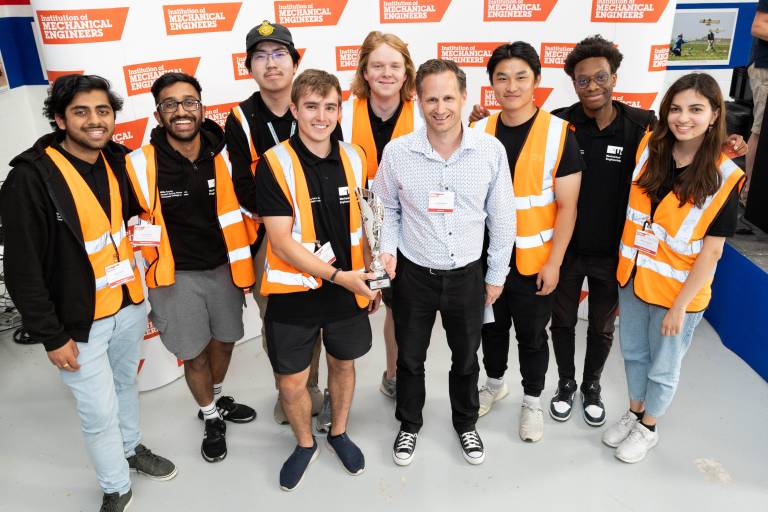UCLR team “Nova” wins IMechE Unmanned Aerial System Challenge 2023 Operational Supportability Award
5 July 2023
A group of undergraduate students from UCL Mechanical Engineering won an award in IMechE Unmanned Aerial System (UAS) Challenge 2023 for the outstanding design of their unmanned helicopter.

A group of undergraduate students from UCL Mechanical Engineering won an award in IMechE Unmanned Aerial System (UAS) Challenge 2023 for the outstanding design of their unmanned helicopter. The team were presented the Operational Supportability Award in the annual competition that took place in Buckminster, England.
Competing with 26 other international teams in the competition, Nova – one of the teams under the department's UCL Racing (UCLR) umbrella – had the opportunity to showcase their design and engineering skills by delivering formal presentations of their UAS before a panel of senior engineers from across the aerospace industry. Additionally, during the competition’s “Fly-Off” event, they were able to demonstrate the capabilities of their UAS, further emphasising the technical achievements of their crafts.
Reflecting on the experience, Nova team member Ryszard Nowacki said:
““Making Dragonfly was an amazing journey that took almost 3 years from start to finish, mainly due to COVID. Designing a helicopter from scratch is an extremely hard feat of engineering and doing so without any initial knowledge about helicopters is even harder.”
Team Nova’s hard work paid off, despite a few obstacles along the way, such as encountering a main rotor shaft failure, an issue that they had to address by arranging an emergency fabrication of broken components back in UCL's MechSpace hub, as well as sourcing parts from a local retailer early in the morning.
With the team’s outstanding aircraft and storage design, they were presented the Operational Supportability Award. Ryszard explained:
“The award emphasised how well we designed our storage solution to be easily transportable and accessible by the ground team and service team during the operation of the UAS. People were also impressed with our own design and manufacturing of the UAS airframe and that we adopted fixed-wing design for our model. From detailed startup procedures and pre-flight checks through industry-standard carbon fiber build and up to a modular drivetrain design which has allowed us to easily isolate the encountered drivetrain problem and fix it within a day fully disassembling and assembling the helicopter twice in the process.
In the end, our UAS managed a manual take-off and landing but a fully autonomous waypoint navigation and payload drop, completing all of the 20 mission waypoints in a 5 km flight that took around 8 minutes. The payload that our 5.5kg helicopter took was 4kg which was the highest payload taken among all other competing teams.”
Ryszard and his team members believed that taking part in the competition had been a rewarding experience.
“The team would like to thank the department and staff and technician from MechSpace, for advising us and helping us manufacture the aircraft in tens of different machining operations, especially Phil and Sandeep for making a component for us on the competition day when the drivetrain breakdown was discovered.”
 Close
Close

